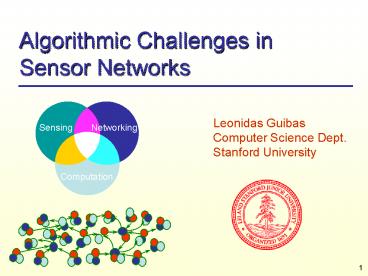Algorithmic Challenges in Sensor Networks PowerPoint PPT Presentation
Title: Algorithmic Challenges in Sensor Networks
1
Algorithmic Challenges inSensor Networks
Leonidas Guibas Computer Science Dept. Stanford
University
2
Some Obvious Desiderata
- Naturally, we want algorithms that are
- efficient
- distributed
- energy-aware
- robust
CACM, 04
3
Use Data Redundancy to FightImperfect Calibration
- Topological data analysis
- Large-scale features of a signal landscape should
be visible even without perfect - localization
- time-synch
- sensor calibration
4
Keeping In-Network Processing Simple
- Compressed sensing
- Exploit network coding to produce universal data
aggregators - Data read-out proportional to signal landscape
complexity
Base station
Data aggregation
5
Global Advice for Local Methods
- Local, greedy, reactive methods are natural for
sensor networks - Such methods can get stuck is local minima
- How much global knowledge is needed to bypass
most of these - How can this knowledge be obtained robustly?
6
Resource-Adaptive Algorithms
- The resources (e.g., computation, storage)
available to a sensor network algorithm may vary
dynamically, even as the algorithm runs - How can we design algorithms that move smoothly
over a quality vs. resources trade-off curve,
even as they run?
q-digest update Shrivastava et. al., SenSys04
7
The Impact of AlternativeInformation
Representations
- The identity management problem
- Operations
- evidence about identity
- target mixing
- Marginal probabilities require global
normalization at each evidence event - Accumulated log-likelihoods do not ...
8
Parting Thoughts
- Successful algorithmic design depends upon
certain stable abstractions that can describe the
functionalities of a sensor network, as well as
their associated costs - Good data models are essential as well the
special structure of the data in each application
must be exploited for the best algorithms
9
The End
PowerShow.com is a leading presentation sharing website. It has millions of presentations already uploaded and available with 1,000s more being uploaded by its users every day. Whatever your area of interest, here you’ll be able to find and view presentations you’ll love and possibly download. And, best of all, it is completely free and easy to use.
You might even have a presentation you’d like to share with others. If so, just upload it to PowerShow.com. We’ll convert it to an HTML5 slideshow that includes all the media types you’ve already added: audio, video, music, pictures, animations and transition effects. Then you can share it with your target audience as well as PowerShow.com’s millions of monthly visitors. And, again, it’s all free.
About the Developers
PowerShow.com is brought to you by CrystalGraphics, the award-winning developer and market-leading publisher of rich-media enhancement products for presentations. Our product offerings include millions of PowerPoint templates, diagrams, animated 3D characters and more.

